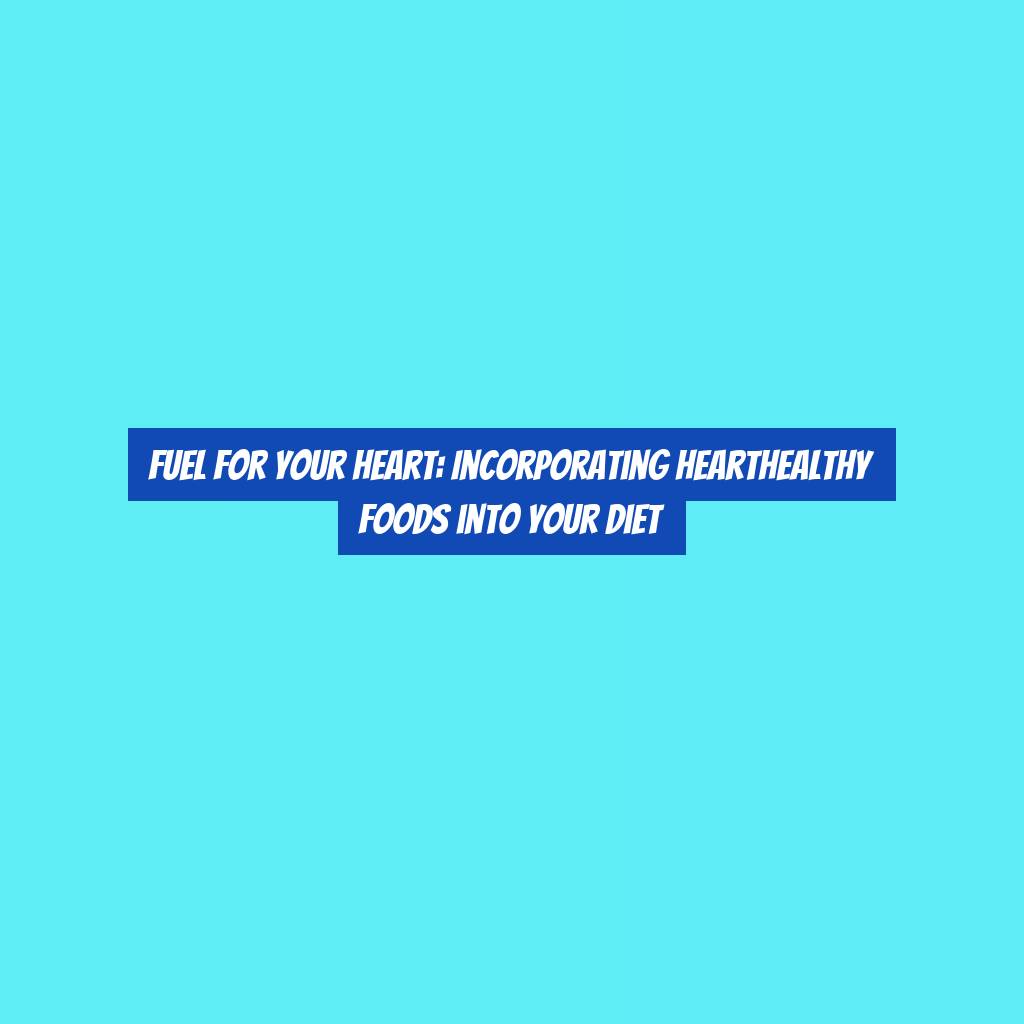Fuel for Your Heart: Incorporating HeartHealthy Foods into Your Diet
You know that incorporating heart-healthy foods into your diet is crucial for maintaining a healthy heart. But do you know which foods are best for keeping your heart in top shape?
Understanding the impact of different nutrients and making informed choices when it comes to your meals can make a significant difference in your heart health.
So, letG??s explore the key nutrients and top food choices to fuel your heart and keep you feeling your best.
Understanding Heart-Healthy Foods
To maintain a healthy heart, itG??s crucial to understand the role of different foods in your diet. Some foods can clog your arteries and increase the risk of heart disease, while others can help keep your heart strong and healthy. Understanding the difference is key to making informed choices for your well-being.
Fruits and vegetables are essential components of a heart-healthy diet. TheyG??re packed with vitamins, minerals, and antioxidants that support heart health. Incorporating a variety of colorful fruits and vegetables into your meals provides a wide range of nutrients that can benefit your heart.
Whole grains are another important part of a heart-healthy diet. TheyG??re high in fiber, which can help lower cholesterol and improve heart health. Choosing whole grain options like brown rice, quinoa, and whole wheat bread over refined grains can make a significant difference in your heart health.
Additionally, including lean proteins such as fish, poultry, and legumes in your diet can provide essential nutrients without the unhealthy saturated fats found in red meat. Making these simple yet impactful changes to your diet can contribute to a healthier heart and overall well-being.
Key Nutrients for Heart Health
Ensuring your diet includes key nutrients is vital for maintaining a healthy heart and overall well-being.
Two essential nutrients for heart health are omega-3 fatty acids and potassium. Omega-3 fatty acids, found in fatty fish like salmon, as well as in flaxseeds and walnuts, can help lower the risk of heart disease by reducing inflammation and improving cholesterol levels.
Potassium, abundant in foods such as bananas, sweet potatoes, and spinach, plays a crucial role in regulating blood pressure and supporting heart function.
In addition to omega-3 fatty acids and potassium, fiber is another key nutrient that promotes heart health. Foods high in soluble fiber, such as oats, lentils, and fruits like apples and oranges, can help lower cholesterol levels and reduce the risk of heart disease.
Furthermore, antioxidants like vitamin C, vitamin E, and selenium, found in berries, nuts, and seeds, can protect the heart by combating oxidative stress and inflammation.
Top Heart-Healthy Food Choices
Incorporating heart-healthy foods into your diet is essential for maintaining optimal heart function and overall well-being. Some of the top choices you should consider are fatty fish such as salmon, mackerel, and trout. These fish are rich in omega-3 fatty acids, which can help lower the risk of heart disease.
Nuts, especially almonds, walnuts, and pistachios, are also excellent options. TheyG??re packed with healthy fats, protein, and fiber that can help lower bad cholesterol levels. Berries like strawberries, blueberries, and blackberries arenG??t only delicious but also loaded with antioxidants, vitamins, and fiber that promote heart health.
In addition, incorporating whole grains like oats, quinoa, and brown rice into your diet can provide essential nutrients and fiber that support heart health. Dark chocolate, in moderation, can also be included due to its high cocoa content, which is associated with lower heart disease risk. Lastly, incorporating leafy green vegetables such as spinach, kale, and collard greens can provide vitamins, minerals, and antioxidants that contribute to a healthy heart.
Cooking Heart-Healthy Meals
Looking for ways to cook heart-healthy meals that are delicious and nutritious?
Start by using heart-healthy cooking oils like olive or canola oil instead of butter or lard.
When preparing meats, opt for lean cuts and trim off visible fats before cooking. Try grilling, broiling, or baking your meats instead of frying.
Incorporate plenty of fruits and vegetables into your meals. Roasting or steaming vegetables helps retain their nutrients and natural flavors.
Experiment with different herbs and spices to add flavor without relying on excessive salt.
Choose whole grains like brown rice, quinoa, or whole wheat pasta over refined grains for added fiber and nutrients.
When cooking, aim to reduce the amount of added sugars and opt for natural sweeteners like honey or maple syrup.
Lastly, be mindful of portion sizes to avoid overeating.
Incorporating Heart-Healthy Snacks
When it comes to snacking for heart health, choosing nutrient-dense options like nuts, seeds, and fresh fruits can help you maintain a balanced and healthy diet.
Nuts such as almonds, walnuts, and pistachios are excellent choices for heart-healthy snacking. TheyG??re rich in unsaturated fats, omega-3 fatty acids, and fiber, which can help lower bad cholesterol levels.
Seeds like chia seeds, flaxseeds, and pumpkin seeds are also great options as theyG??re packed with heart-healthy nutrients including omega-3 fatty acids, fiber, and antioxidants. Additionally, they can be easily added to yogurt or salads for a quick and nutritious snack.
Fresh fruits such as berries, apples, and oranges arenG??t only delicious but also provide essential vitamins, minerals, and dietary fiber, which are beneficial for heart health. Consider pairing fruits with a source of protein like Greek yogurt or a small handful of nuts for a satisfying and heart-healthy snack.
These options arenG??t only convenient but also contribute to overall heart health and well-being. Remember to watch portion sizes and avoid excessive added sugars and sodium when choosing heart-healthy snacks.
Conclusion
So, now you know the key nutrients and top food choices for a heart-healthy diet. Remember to incorporate these foods into your meals and snacks for a healthier heart.
Cook with heart-healthy ingredients and enjoy the benefits of a nutritious diet. Your heart will thank you for making these simple but impactful changes to your eating habits.
HereG??s to a healthier heart and a healthier you!



